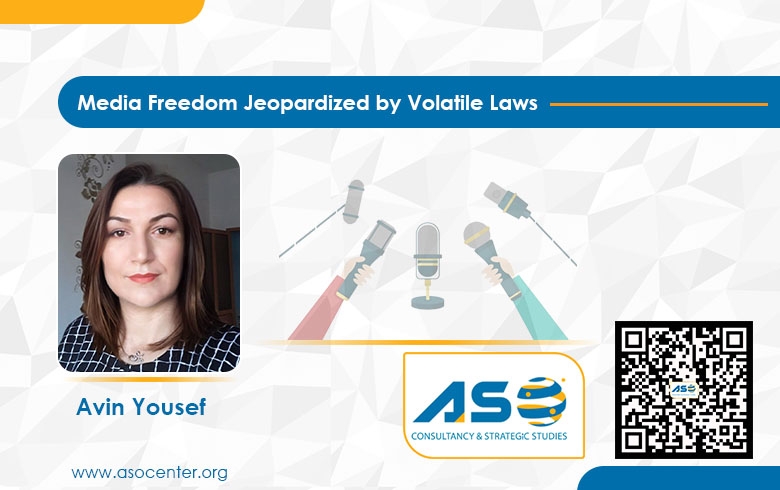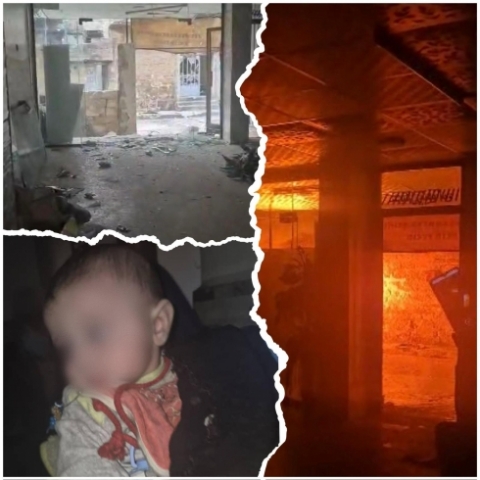

Media Freedom Jeopardized by Volatile Laws
2020-10-21
Avin Yousef
The Media High Council, in cooperation with some academic media colleagues, enacted a law in 2015 to regulate media work in the Self-Administration areas. They based their drafting on a set of international laws, in line with the region's reality. Back then, the media law was commensurate with the current circumstances, although it included some gaps. However, the problem did not lie in the law's articles or those gaps, but rather it was in the implementation mechanism, or in other words, its non-implementation.
Accordingly, the Free Media Union called for amending the law, filling its loopholes and communicating with the concerned authorities in the Self-Administration in NES, during the period of which the administration was restructured, its bodies were formed and the media office that replaced the Media High Council was opened to be in charge. As the emerging administration responded to the Union's demand and formed a legal committee specialized in amending the media law in NES, consisting of 9 members who are; representatives of each of the Media Office and the Free Media Union, in addition to independent academic journalists and jurists.
Therefore, does enacting a law for media consider an entrenchment of bureaucracy, suppressing freedom of the press, and restricting the rights of journalists to obtain information and express their opinions? Or are the provisions addressed in the draft law, which was recently discussed with many academic and media journalists, will guarantee their rights and protect them from violations that they may be exposed to during their work and limit the interference of political, security and military actors in the media work? This is due to the fact that the region has witnessed violation and punishment of some journalists and media outlets, in recent years, without relying on legal regulations or even referring them to the judiciary.
The Media Office (the official executive media agency that supervises media affairs and its roles), affiliated to the Self-Administration in NES, has been working in coordination with the Free Media Union (an independent trade-union institution) for a year on amending and reforming the media law.
Law reform is a process depicted in considering previously-enacted laws and it aims at enhancing equity or efficiency in calling for changes in legal systems and their implementation. It is typically relevant to specialized bodies or committees, representing the institutions that were established to facilitate the amendment process. As they work to conduct research and suggest methods through which laws can be simplified and updated. Usually these institutions are independent from government authority and they guarantee intellectual independence in the modernization mechanism of laws. Hence, this enables them to follow objective methods to reform laws, either by abolishing them and enacting new laws, or merging laws (changing the current law) and creating new provisions to be added to them.
Laws are also considered one of the most essential means of social control, rather, they are pillars on which the organized society depends in controlling the behavior of its members. The law plays a fundamental role in preserving the cohesion and stability of society when adhering to its provisions, by controlling justice, security and freedom.
However, this remains theoretical, as in practice, the question is; "Will the media law achieve the goals that its creators hope and aspire to by media professionals, or will it be unfulfilled as it was nearly five years ago?!"
Through my work in media, following this field and being a co-chair of the Free Media Union as well, which is the only body working in the region in defense of journalists' rights, we received complaints from journalists and media workers working in NES areas. These complaints were violations that were carried out against them by the Self-Administration institutions or some of their employees.
Among our basic tasks in the Union was direct intervention and communication with the concerned authorities, through a written letter addressed to that violating party, or by direct communication by phone or in presence, in order to mitigate these violations, which varied in severity from one journalist to another. As journalists faced many difficulties in obtaining information, the principle of which the media law stresses in its general principles, since favoritism and mediations played their role in the media, while some were insulted and humiliated by some working individuals in the Self-Administration institutions and others were subjected to defamation. Contrary to what the Article (32) of the Media Law, Chapter 12 (Violations and Penalties) states; “Every person, regardless of his/her status, shall be punished according to the Canton's general penal code, if he/she insults or assaults a journalist or a media figure on his/her duty." Sometimes, the media’s devices were confiscated, whether it was a camera or a mobile phone, and their contents were erased without any deterrence, despite the media’s possession of an official work mission from the media office. Violations in some cases reached thrusting, beatings and breaking cameras. As well as, decisions were issued to suspend the work of some Journalists and the closure of media institutions offices, without clear articles in the law on which the executive authority relies.
Hence, it is worth noting that there are no judicial regulations related to the media profession, according to which a journalist is prosecuted or punished, in case he/she violates professional standards of journalism. There are also no articles or regulations related to the media profession in the charter of the new understanding of the Self-Administration in NES, while it was mentioned in Chapter 7 of (The Social Contract for Democratic Federalism in Rojava - Northern Syria) Article /77/ that the Media, Publishing and Information Foundation "organizes itself independently according to the principles of free and democratic media and publishing. It also, assists in the development of media and publishing institutions, supports them, and secures their free media activities within legal frameworks. It does not allow monopoly in the media and publishing field, but rather monitors and supervises Media Freedom achieved by society’s freedom to receive the necessary news and information. Likewise, it is in charge of securing financial support for all media and publishing devices in a fair and equal manner in accordance with legal frameworks."
What is meant by "the media and publishing institution"? Is it the Media High Council? What are the legal frameworks covered by the article? The article adds that; "The institution consists of a sufficient number of members, elected by the conference or regional councils; consisting of representatives of groups and social strata." In this paragraph of the same article and through my follow-up, the members of the Media High Council were not elected at the time and no conference was held through which the members of the institution or the council were elected, but rather they were appointed by the Executive Council of the Self-Administration. Thus, the question is; "Were the Board members appointed according to specific professional standards? Do they have the qualifications and competencies that are necessary for the exercise of their administrative work in the Council?" In this particular area, the Media Council is supposed to be independent in itself and not affiliated with the Executive Council in the Self-Administration. This in order for it to be neutral in decision-making, maintain the principles of freedom of opinion and expression and ensure justice and media diversity, as well as, not to interfere with its powers.
It is necessary, by amending the law, to clarify many ambiguous matters concerning the media and media workers in the region, which were also mentioned in the social contract of the Self-Administration and in the media law. Especially with the increase in media institutions operating in the region, the increase in the number of media workers, the so to speak media chaos that has spread in the media since the beginning of the Syrian crisis and the failure of some media professionals to adhere to professional standards. In addition to confusion of powers and direct and indirect interference by some political, security and military actors in the media work.
It was very significant to discuss the draft of the amended law with academics and experienced journalists and to take into account the proposals of media workers without exception, in order to come up with an adequate and long-term legal formula. This in its turn will be carried out to protect the rights of media professionals and media institutions alike, to call for the maintenance of professional standards for journalism and to abide by the code of journalistic honor and ethical controls for journalism.
Finally, for the sake of establishing a free media that enjoys freedom of opinion and expression, to consolidate the values of freedom and democracy and to grant journalists more freedom of work, without preventing them from obtaining, publishing or broadcasting information, all concerned parties must adhere to and respect the provisions of the law and its executive regulations.
Moreover, to limit bureaucracy and not interfere with the powers of the media office in the Self-Administration and to show more openness to the media profession. The unions, Press Syndicate and the media office, in NES, should follow up on a mechanism for implementing the law and ensure compliance with its provisions by all concerned parties, media institutions and media professionals.



